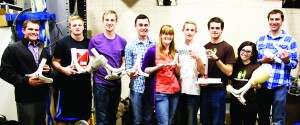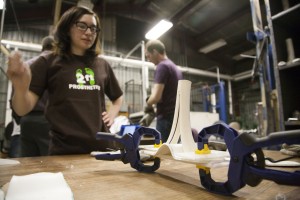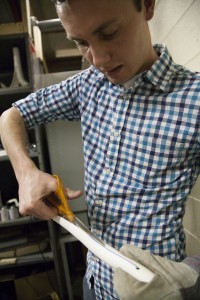
BYU students in the 2ft Prosthetics Club meet in a warm corner of one of the outdoor engineering labs several times a week to tinker and tweak their designs for a prosthetic leg.
The 2ft Prosthetics organization began as a club of BYU and UVU students meeting together to find a way to better the world with their technical skills. What came out of that initial club was the current organization and a cheap and easy way to allow amputees in impoverished countries to walk again.
David Williams, the club’s chairman, helped to create a prosthetic leg made almost entirely out of polyvinyl chloride, more commonly known as PVC pipe. The pipes are sawn and then molded into the desired shape using a warm oven and then bolted tightly to hold everything in place.
Once the legs are molded and bolted, the club members use a series of hydraulic pistons that simulate walking and test the durability of their design. The students measure the number of cracks and breaks then re-calibrate and start again.

The average prosthetic leg in the United States costs between $5,000 and $50,000, with an average lifespan of five years. The PVC prosthetic leg costs roughly $20 and works for roughly one year, depending on wear and tear, according to the engineers.
Ashlie Burton, an applied physics major and 2ft Prosthetics technician, said the legs take roughly two hours to make and can be suited for most types of leg amputations. Burton explained their purpose in the lab isn’t to build legs for people, but to work on the design, so when they go to other countries they can teach them to build these legs themselves.
“We make them here to test them; when we go to other countries we teach people how to make them,” Burton said. “They have to be made very specifically to the person. The foot is pretty standard, but they still have to bend it differently for each person.”
PVC is a cheap material and was chosen because it can be found in almost any country, especially countries that simply can’t afford costly prosthetics. This also means these engineers can try many new adjustments and options without spending much money.

“Our main thing is to keep the price really low. We don’t want them to have to import a lot of stuff into these other countries, so when we go to other countries our purpose is to teach them how to make these so that they can be self-sufficient,” said Ryan Jenson, an applied physics major at BYU.




